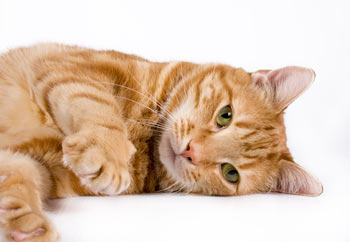FIP: Feline Infectious Peritonitis in Cats

FIP in cats is a serious and usually fatal infection. It is not easy to diagnose, has very few treatments, and is not curable. This terrible condition is not easy to understand, and scientists are still studying and learning more about it.
What Causes FIP in Cats?
FIP is caused by a type of feline enteric coronavirus. Coronavirus is spread from cat to cat through fecal-oral transmission. Cats ingest the virus by cleaning themselves off after contacting the stool of an infected cat.
There are many strains of coronavirus, and most of them cause no disease in cats. A few of these viruses can cause mild fever and flu-like signs in cats, but these are mild illnesses that resolve on their own. However, in 5-10% (Feline Infectious Peritonitis, 2002) of infected cats, the virus is not so mild. Scientists believe that, in these cases, the virus mutates inside the body, and then the cat's own immune system mounts an inappropriate response to it and aids in its spread. The virus travels throughout the cat's system in the white blood cells, causing widespread inflammation. The inflammation leads to fever, organ failure, and possibly fluid accumulation in the cat's body cavities: the chest and/or abdomen. When this fluid accumulation occurs, the cat is said to have the wet form of FIP. Cats without the fluid have the dry form. Both forms are fatal.
Which Cats Are at Risk for Developing FIP?
Any cat that contracts a coronavirus may develop FIP, and these viruses are quite common in the environment. However, the following groups of cats seem to develop FIP more commonly than others, probably because of immature or suppressed immune systems:
- Kittens and young cats less than 2 years of age
- Geriatric cats
- Cats that have feline leukemia virus
- Cats in catteries, shelters, or other multiple cat situations
Signs of FIP
When a cat is infected with feline enteric coronavirus, there are often no signs of illness. Some cats may have a slight fever, mild respiratory signs, or some diarrhea that clears up on its own in a day or two. Very few cats that contract coronavirus end up developing FIP, but those that do may not show signs for months or years after the original coronavirus infection. Signs when they do occur may include:
- Decreased appetite
- Poor hair coat
- Lethargy
- Anemia
- Fever
- Pot-bellied appearance (wet form)
- Labored breathing or coughing (wet form)
- Neurological signs such as wobbliness or seizures
- Abnormalities in the eyes
Diagnosis of FIP
Diagnosing FIP in cats is extremely difficult. There are multiple tests that can be done, but these only detect whether the cat has antibodies to feline enteric coronavirus. Since many cats are exposed to and develop antibodies to coronavirus but don't go on to develop FIP, this type of test doesn't tell the veterinarian much about the current disease process.
Diagnosing FIP is done by ruling out other illnesses and putting puzzle pieces together that point toward FIP. Some of those puzzle pieces include:
- Decreases in white cell counts, red cell counts (anemia), and platelets may be seen on blood work.
- Increased protein levels are found quite consistently in the blood of cats with FIP.
- The fluid that is removed from the chest or abdomen of cats with FIP often has certain characteristics such as a high protein level and the presence of certain characteristic white blood cells.
- PCR testing can be done on fluid or tissues to look for pieces of the virus. It doesn't currently differentiate between regular feline enteric coronavirus and the mutated FIP virus.
- Histopathology of tissues in an infected cat can confirm FIP. However, this test is usually a post-mortem one.
Treatment of FIP
Unfortunately, there is no effective treatment or cure for FIP in cats. Some treatments may help affected cats feel better and live a bit longer. Some or all of the following may be used as supportive treatments for cats with FIP:
- Fluid therapy: intravenous (IV) or subcutaneous (SQ) fluids may be given to FIP-infected cats in order to keep them hydrated, supporting their bodily systems.
- Antibiotic treatment may help control secondary infections that take advantage of an FIP-infected cat's weakened system.
- Blood transfusions may help with the anemia from which many FIP-infected cats suffer.
- Corticosteroids may be given to decrease the cat's inflammatory response to the FIP virus.
- Draining any fluid that has accumulated in an FIP-infected cat's chest or abdomen can help them feel much better. The fluid will re-accumulate, and its removal will need to be repeated periodically.
There are drugs that modulate immune responses as well as anti-viral drugs being tested for their potential to help cats with FIP in hopes that better treatments can be developed for this disease.
Prevention of FIP
Because FIP is the result of the mutation of the common feline enteric coronaviruses, it is difficult to prevent cats from being exposed and impossible to determine whether a cat will experience the mutation to FIP. Still, there are a few things you can do to try and decrease the chance that your cat will be exposed to coronavirus.
- Keep litter boxes, bedding, and other surfaces as clean as possible if you have a multi-cat situation. Don't keep litter boxes near food and water dishes.
- If you get a new cat, keep him separated from your resident cats. Your veterinarian may wish to run an FIP antibody test to determine whether your new cat has been exposed to coronavirus in the past. It may be impossible to determine if it is a current infection, however.
- Keep your cats as healthy as possible by keeping up with any vaccinations that your veterinarian recommends for them, providing good nutrition, and taking them to the veterinarian right away if they show signs of illness. Sick cats are more likely to experience mutation of feline coronavirus to FIP if they are exposed to it.
FIP is a frustrating, heart-breaking disease in cats, and hopefully more research will shed light on better ways to diagnose and treat it.
You May Also Like These Articles:
Cats Snoring: Normal or Abnormal?
How to Be Prepared for Your Cat's Veterinary Bills
Bubonic Plague: Cats are Highly Susceptible
Notice: Ask-a-Vet is an affiliated service for those who wish to speak with a veterinary professional about their pet's specific condition. Initially, a bot will ask questions to determine the general nature of your concern. Then, you will be transferred to a human. There is a charge for the service if you choose to connect to a veterinarian. Ask-a-Vet is not manned by the staff or owners of CatHealth.com, and the advice given should not delay or replace a visit to your veterinarian.






